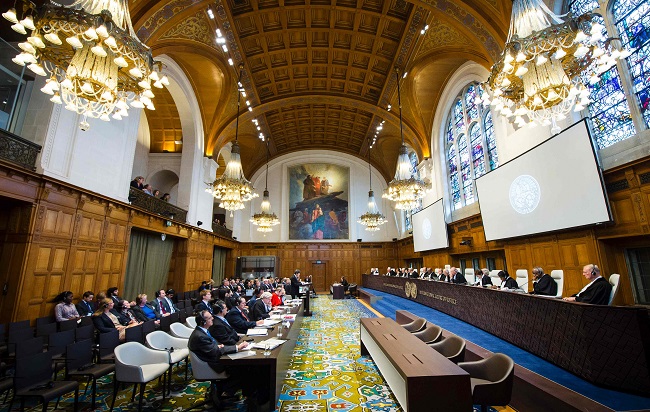On Wednesday, July 23, 2025, the International Court of Justice (ICJ), the world’s highest court, issued its long-awaited Advisory Opinion on states’ legal obligations in the face of climate change, offering unprecedented legal clarity on how existing international norms apply to address the climate crisis, with significant implications for ongoing and future fossil fuel production.

The landmark ruling affirms that climate action is not optional: it is a binding legal duty grounded in existing treaty regimes and customary law, including human rights and environmental law. The Court acknowledged states have an obligation to prevent environmental harm, protect present and future generations from the escalating impacts of the climate crisis and to cooperate internationally. In a significant outcome, the Court found that fossil fuel production, licensing and subsidies “may constitute an internationally wrongful act”.
Importantly, the Court showed a pathway toward a solution – that “Co-operation between States is the very foundation of meaningful international efforts with respect to climate change” and that “treaties and their coordinated forms of implementation are a principal expression” of this cooperation. This has undoubtedly been the case in recent major international legal efforts, spearheaded by small groups of nation-states, such as the 17 nations participating in the development of a Fossil Fuel Non-Proliferation Treaty, and the core group of countries who brought these questions before the International Court of Justice on Wednesday.
Ralph Regenvanu, Minister for Climate Change, Energy, Meteorology, Geohazards, Environment and Disaster Management for the Republic of Vanuatu, said: “This initiative was part of efforts to get the action quicker because we have been in the UNFCCC process for 30 years – we are pulling all international levers possible. We were part of the group that went to ITLOS and got the advisory opinion. We made a submission as part of the Inter-American Court of Human Rights and are pushing for the crime of ecocide to be recognised by the ICC. We are also part of the Fossil Fuel Non-Proliferation Treaty Initiative, where we’re pushing to get more countries on board and trying everything at the international level to speed up action. Today has been a concrete contribution to that.”
Vishal Prashad, Director, Pacific Islands Students Fighting Climate Change (PISFCC), said: “By affirming the science, the ICJ has mandated countries to urgently phase out fossil fuels because they are no longer tenable. For Small Island States, communities in the Pacific, young people and future generations, this opinion is a lifeline and an opportunity to protect what we hold dear and love. I am convinced now that there is hope and that we can return to our communities saying the same. Today is historic for climate justice and we are one step closer to realising this.”
The opinion reinforces what climate vulnerable nations and frontline communities have long demanded: that wealthy, high-emitting states must align with international law by rapidly reducing emissions, ending fossil fuel expansion, and supporting those harmed by the crisis through finance, adaptation, and remedy.
The Court left no legal shelter for business-as-usual. It made clear that the status quo is incompatible with states’ legal obligations under international law – a finding that will inform climate litigation and advocacy for years to come.
Kumi Naidoo, President, Fossil Fuel Non-Proliferation Treaty Initiative, said: “This opinion should serve as a clarion call to governments and institutions stalling the fossil fuel phaseout. The ICJ has affirmed what we have long known – that states have a legal duty to protect people and the planet from the impacts of the climate crisis, including taking appropriate action to prevent harm from fossil fuels. This reinforces the urgent need for a Fossil Fuel Non-Proliferation Treaty, which offers a bold, clear path to turn these obligations into concrete, just action. We applaud the Pacific states that made the voices of frontline communities and their calls for climate justice heard on the global stage and catalysed this historic ruling.”
The court emphasised that existing legal frameworks set forth binding obligations upon all States to act on climate change, highlighting their duty to cooperate in good faith to find solutions. The ICJ’s decision signals that climate obligations extend beyond existing climate treaties and that ambition is not a matter of voluntary pledges. They are rooted in binding legal rules and principles, including the right to life, health, culture, and a healthy environment.
This outcome is only the beginning. Like past landmark ITLOS and Inter-American Court opinions, this ruling will shape a new era of climate justice. Now, it is up to communities and governments to bring it to life.
